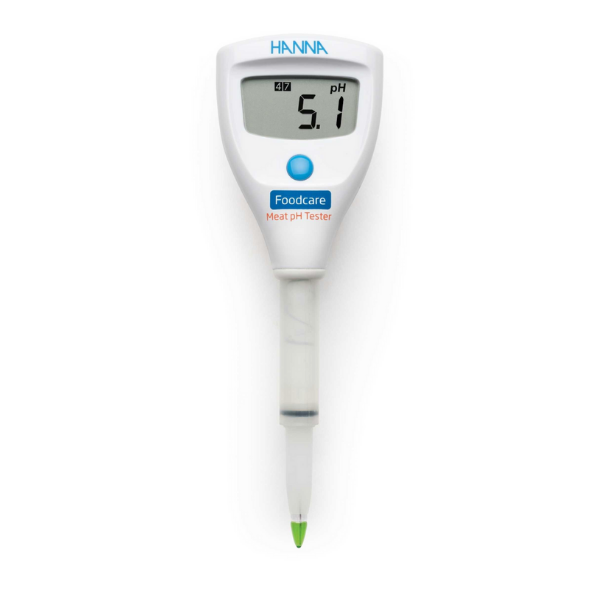Hanna HI-981036 pH Tester for Meat
Product Details
The HI981036 Foodcare Meat pH Tester is an application-specific designed pH tester for the measurement of pH during meat processing. The meter offers many advanced features including a pH electorode designed specifically for the measurement of meat.
pH electorode with replaceable bridge electrolyte
The pH has an outer junction sleeve that can be removed and cleaned. Once cleaned a small amount of supplied get electolyte is added and the junction is refreshed, improving the pH measurement and extending the life of the meter.
Low temperature (LT) Glass
The pH glass tip uses a special low-temperature glass with a lower resistance of approximately 50 megaohms compared to general-purpose (GP) with a resistance of about 100 megaohms. This is beneficial when measuring food products at lower temperatures in order to have the ideal resistance for the measuring circuit.
Conical Tip
Allows for easy penetration into solids and semisolids, which is needed when wanting to take a direct measurement in meat.
PVDF Body
Polyvinylidene Flouride (PVDF) is a food-grade plastic that is resistant to most chemicals and solvents, including sodium hypochlorite. It has high abrasion resistance, mechanical strength, and resistance to ultraviolet. PVDF is also resistant to fungal growth.
Large LCD
An enhanced dusokats the measurement reading, stability indicator, low battery indicator, and calibration tags.
Automatic calbibration
The foodcare meat pH tester is calibrated automatically to one or two points. The calibration buffers are automatically recognized and after calibration, the buffer values used are shown on the display.
Stability Indicator
An hourglass indicator is displayed on the LCD until a stable reading is obtained. Once a reading stabilizes the indicator disappears and a reading can be taken.
Automatic Shut-off
The meter can be set to automatically turned off after 8 minutes or 60 minutes to conserve battery life in the event that the meter is left on. The auto-off feature can also be disabled.
Probe Diagnostic
During calibration, the meter will display an error (Err) message as an indicator that the probe needs to be cleaned.
Long Battery Life
The Foodcare Meat pH Tester has an exceptional battery life of approximately 1000 hours. When the battery power is running low, a low battery indicator will be displayed.
Economical
The FoodCare Meat pH Tester is a fully-featured meter at a price that is affordable for both the hobbyist and meat-making professional.
This meter is supplied with:
- pH 4.01 buffer solution liquid sachet x 2
- pH 7.01 buffer solution liquid sachet x 2
- Electrode cleaning solution sachets x 2
- Gaelled bridge electrode storage solution.
- CR2032 3V Li-ion battery quality certificate.
- An instruction manual.
*6 months warranty*
The meter has been specially designed for meat processing. In the meat processing industry, the monitoring of pH is considered to be the utmost importance due to its effect on the meat’s quality factors including water binding capacity and shelf life. Upon slaughter, biochemical processes begin to break down the meat. Glycolysis begins post-mortem, converting glycogen to lactic acid, reducing the pH of the carcass. Depending on a number of factors such as type of animal and even breed, this decrease in pH can take anywhere from a single hour to every day. It is vital to monitor pH during this phase as once the lowest pH value is reached, the pH will begin to slowly rise, indicating that decomposition has begun.
The pH value of meat influences its water-binding capacity which directly impacts consumer qualities such as tenderness and colour. Lower pH values result in a lower water-binding capacity and lighter colours. Factors such as these can be important when considering how to efficiently produce meat products. For example, when producing dry sausages the meat must have a low water binding capacity so that it can dry evenly. Depending on the type of the final product and the steps required to get there, pH values will vary throughout the meat processing industry. It is imperative, regardless of the final product, that pH is maintained at a low value to prevent bacterial spoilage and comply with food safety regulations. By monitoring pH values throughout the meat production process, you can ensure the creation of consistent and safe meat products.


